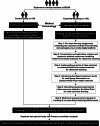Using Nobel Prize case-based learning in Medical Immunology to cultivate critical thinking dispositions for medical undergraduates
- PMID: 39449021
- PMCID: PMC11520106
- DOI: 10.1186/s12909-024-06155-x
Using Nobel Prize case-based learning in Medical Immunology to cultivate critical thinking dispositions for medical undergraduates
Abstract
Background: Critical thinking has been regarded as an essential skill for college students, which is especially imperative for medical students to possess the ability to have in-depth insight into complex clinical situations. Medical Immunology is an overarching principle connecting multiple medical subjects, which emphasizes that immunity is both beneficial and harmful to the host, thus putting higher demands on students' critical thinking. The utilization of Nobel Prize stories has been cited as a thematic framework for classroom teaching of other courses, showing numerous educational benefits. Therefore, this study rejuvenated a case-based teaching approach by creating and introducing a vibrant material library centered on numerous iconic Nobel Prize cases in Medical Immunology and evaluating its effects on the critical thinking of medical students.
Methods: A total of 70 second-year medical undergraduates from the Beijing University of Chinese Medicine were divided into a control group and an experimental group of 35 cases each. Throughout the semester, the control received the traditional teaching method, and the experimental group adopted case-based teaching based on the Nobel prize-centered material library. The process of teaching design and practice was described using "Antitoxin and immunoserum therapy" as a classical example. A unified assessment of the critical thinking dispositions of participants was conducted at the beginning and end of the semester using the Critical Thinking Disposition Inventory-Chinese Version (CTDI-CV).
Results: Intra-group longitudinal comparisons and inter-group parallel evaluations indicated that, compared with the conventional teaching approach, Nobel Prize case-based learning induced a statistically significant increase in the overall score of the CTDI-CV, as well as the scores within the subdimensions of truth-seeking, analyticity, and maturity in judgment (p < 0.05). Pearson correlation analysis further indicated a positive correlation between the total score of the CTDI-CV and the final grade (p < 0.05), which emphasized the crucial role of critical thinking dispositions in academic achievement.
Conclusion: The case-based classroom teaching centered on Nobel Prize cases for Medical Immunology can effectively improve the critical thinking dispositions of medical undergraduates, which contributes to cultivating high-level medical and healthcare talents with excellent comprehensive quality in the new era.
Keywords: Case-based learning; Critical thinking; Medical Immunology; Medical students; Nobel Prize; Teaching reform.
© 2024. The Author(s).
Conflict of interest statement
The authors declare no competing interests.
Figures
Similar articles
-
Influence of critical thinking disposition on the learning efficiency of problem-based learning in undergraduate medical students.BMC Med Educ. 2019 Jan 3;19(1):1. doi: 10.1186/s12909-018-1418-5. BMC Med Educ. 2019. PMID: 30606170 Free PMC article.
-
Chinese medical students' disposition for critical thinking: a mixed methods exploration.BMC Med Educ. 2021 Jul 16;21(1):385. doi: 10.1186/s12909-021-02801-w. BMC Med Educ. 2021. PMID: 34271893 Free PMC article.
-
Effects of the Information Motivation Behavior Combined With Flipped Classroom Teaching Model on the Professional Competence and Creative Thinking of Urological Nursing Interns.Br J Hosp Med (Lond). 2025 Apr 25;86(4):1-16. doi: 10.12968/hmed.2024.0739. Epub 2025 Apr 15. Br J Hosp Med (Lond). 2025. PMID: 40265537
-
Impact of case-based learning on critical thinking dispositions in Chinese nursing education: a systematic review and meta-analysis.Front Med (Lausanne). 2025 Mar 17;12:1452051. doi: 10.3389/fmed.2025.1452051. eCollection 2025. Front Med (Lausanne). 2025. PMID: 40166064 Free PMC article. Review.
-
Thinking more wisely: using the Socratic method to develop critical thinking skills amongst healthcare students.BMC Med Educ. 2023 Mar 20;23(1):173. doi: 10.1186/s12909-023-04134-2. BMC Med Educ. 2023. PMID: 36941597 Free PMC article. Review.
Cited by
-
AI-Powered Problem- and Case-based Learning in Medical and Dental Education: A Systematic Review and Meta-analysis.Int Dent J. 2025 Aug;75(4):100858. doi: 10.1016/j.identj.2025.100858. Epub 2025 Jun 26. Int Dent J. 2025. PMID: 40578029 Free PMC article. Review.
-
To Evaluate Interdisciplinary Integration in Medical Education Through a Pulmonary Fibrosis Case Study.Adv Med Educ Pract. 2025 Aug 24;16:1529-1536. doi: 10.2147/AMEP.S529501. eCollection 2025. Adv Med Educ Pract. 2025. PMID: 40896361 Free PMC article.
References
-
- Shi N, He S, Jin Z, Qin C. Effects of classroom teaching reform on critical thinking ability of college students. J High Educ. 2022;8(36):136–41. 10.19980/j.CN23-1593/G4.2022.36.033.
-
- Ren X, Tong Y, Peng P, Wang T. Critical thinking predicts academic performance beyond general cognitive ability: evidence from adults and children. Intelligence. 2020;82:101487. 10.1016/j.intell.2020.101487.
-
- Facione PA. Critical thinking: a statement of expert consensus for purposes of educational assessment and instruction. Millbrae, CA: California Academic; 1990.
-
- Stupnisky RH, Renaud RD, Daniels LM, Haynes TL, Perry RP. The interrelation of first-year college students’ critical thinking disposition, perceived academic control, and academic achievement. Res High Educ. 2008;49(6):513–30. 10.1007/s11162-008-9093-8.
-
- Liu CW, Tang MY, Wang MW, Chen L, Sun XH. Critical thinking disposition and academic achievement among Chinese high school students: a moderated mediation model. Psychol Schools. 2023;60(8):3103–13. 10.1002/pits.22906.
MeSH terms
Grants and funding
- XJYS21007/Educational Research Foundation of Beijing University of Chinese Medicine
- XJY22032/Educational Research Foundation of Beijing University of Chinese Medicine
- ZYYCXTD-C202001/Innovation Team and Talents Cultivation Program of the National Administration of Traditional Chinese Medicine
- MSGZF-202207/Teaching Master workshops of Beijing University of Chinese Medicine
LinkOut - more resources
Full Text Sources



